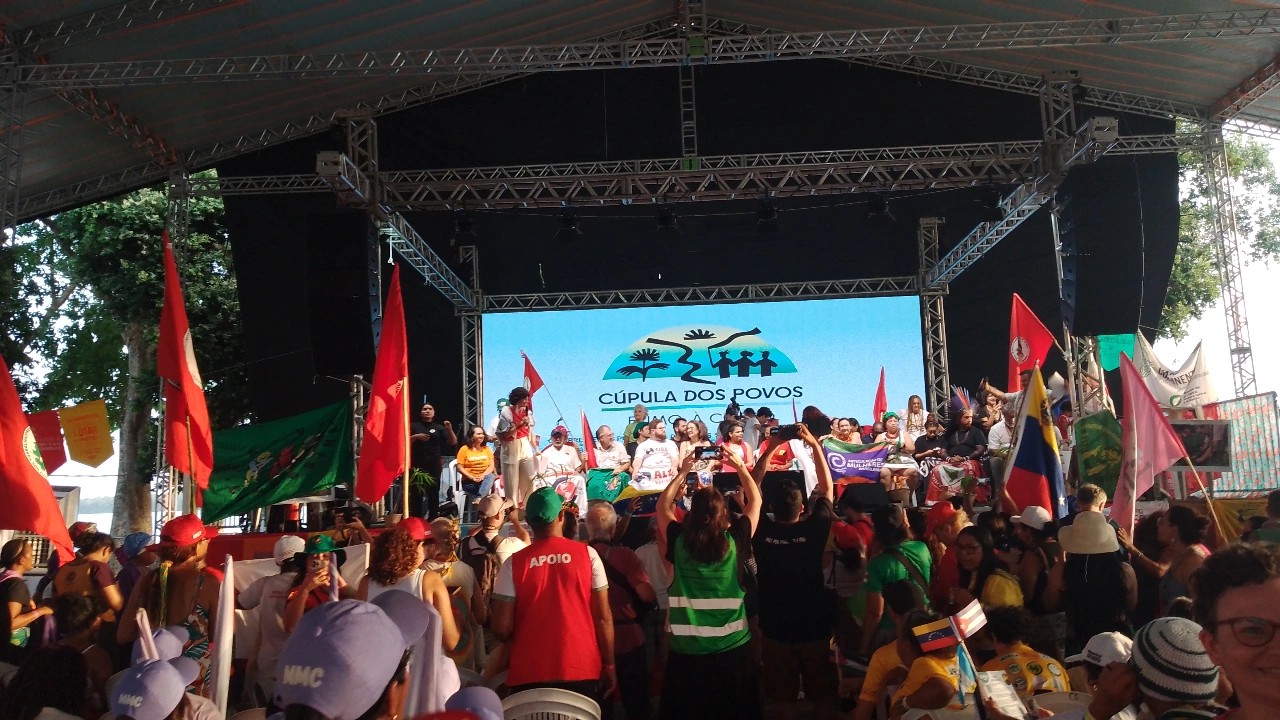
Unity, territory, and resistance mark the Assembly of Social Movements
The assembly highlights grassroots work, autonomy, and popular alternatives as pillars of change
by Janayna Rodrigues
The Assembly of Social Movements, held on the main stage of the People’s Summit space at the Federal University of Pará (UFPA), reminded us once again why we continue to struggle. Its opening, led by the Landless Workers’ Movement (MST), brought art, mysticism, and the defense of Agrarian Reform to the center of the debate. Soon after, the World March of Women took the stage doing what it always does: occupying the space with courage, voice, rhythm, and demands, reaffirming the role of women in building popular alternatives. The opening, marked by cultural expression, already revealed the tone of a plenary grounded in struggle, unity, and collective commitment.
In the first part of the plenary, representatives of Latin American movements brought reflections that resonate with all who fight. They spoke of the need to reinvent our ways of relating — spiritually, materially, and territorially. And they reinforced that there is no transformation without grassroots work, without face-to-face dialogue, without conversations with real people. They reminded the audience that we cannot speak of the future without affirming an anti-capitalist, anti-racist, and anti-patriarchal world. The central word in this moment was unity — unity of action, of project, of coordination.
The World March of Women emphasized that our alternatives may seem small or even invisible, but they are what sustain resistance. It is there, in territorial practice, that the new is born and that we reinforce what must be continually repeated: combating racism and patriarchy is not an isolated task, but the work of everyone, because they are pillars of the very system that oppresses us.
The Trade Union Confederation of the Americas — an entity with 54 affiliated organizations across 21 Latin American countries — opened the second part of the plenary by addressing the defense of democracy and peace; the importance of placing life at the center when thinking about solutions for dignity and justice; decent work; and the increasingly evident threat of the far-right in the erosion and withdrawal of labor rights.
La Vía Campesina of Zimbabwe delivered a striking message about the transformative power that resides within us and passes through the construction of true food sovereignty. They reminded participants that this power to transform the world — which we often believe lies far away, in the hands of governments or corporations — also lies within each of us. And that transformation begins when we reclaim something very basic: the right to produce, consume, and decide what we eat.
They contextualized something that seems simple, but when heard carefully, reveals our food vulnerability: we continue buying food and seeds as if that were the only way to live. But it is not. The truth is that we were taught to depend on the market, and we ended up normalizing this dependence. And this is no accident; it is a form of colonization that acts first in our minds, making us forget that other paths exist.
Another point raised was that agroecology has the face of women, both in Africa and in Brazil. They are the guardians of ancestral knowledge and native seeds. It was an invitation to decolonize our thinking and reclaim the autonomy that has always been ours.
Between the speeches of the Assembly sessions, musical performances reminded everyone that culture is also a form of struggle. “Change the system, not the climate” echoed as a reminder of what is truly at stake after this first half.
What remains from the plenary?
In the end, the summaries presented gathered the essential points of the People’s Summit discussions and made clear the direction social movements point to for the future. The centrality of life emerged as a non-negotiable commitment, reinforcing that any societal project must place care, well-being, and dignity at the center of decision-making.
It also became clear that popular sovereignty will not come through decree — it is built in daily life, through the hands of organized people and the practices that emerge from their territories. Along this path, social movements take on the task of confronting and dismantling the structures of the imperialist, colonial, racist, patriarchal, and LGBTQIAPN+phobic system that shapes the inequalities we experience.
The real alternatives discussed in the Assembly will not sprout from official speeches, but from the concrete experience of communities reinventing their ways of living. For this reason, political and economic unity appears as a necessary condition to resist and advance. The horizon is indeed one of struggle, but also one of possible and tangible victories.
And in the end, the closing speeches of the plenary brought precisely this strength: even in the face of violence and attempts at silencing, the people continue to move.
